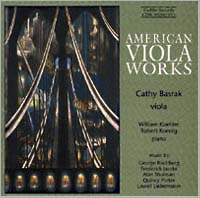Sonata Op.13 (1984) for viola and piano c. 28'00"
I. Allegro moderato
II. Andante
III. Recitativo; Allegro feroce
First performed on April 29th, 1985 at Town Hall in New York City by Neal Gripp, viola and Daniel Lessner, piano
Dedicated to Neal Gripp
First Prize, Victor Herbert/ASCAP Awards, National Federation of Music Clubs 1986
RECORDINGS
REVIEWS
“Lowell Liebermann, a 23-year-old composer from New York City…is, on the strength of this piece alone, a musician and composer of significance…What is astonishing about the piece is not so much the skill with which it has been organized, which is impressive, but the incredible range of emotion it covers. This is music that has something to say - it is not something that has been manufactured for an occasion. The word ‘genius’ is overly exploited these days, but to find someone that young who can so masterfully express warmth, passion, tenderness, anxiety and loneliness without self-consciousness, without over-stating and sentimentalizing, and with a simplicity of means that is deceptive, brings the term immediately to mind.”
The Ottowa Citizen
“Lowell Liebermann’s Sonata for Viola and Piano is a major composition rich in musical content and extremely rewarding for its performers. This work is recommended very highly to all violists…”
Violexchange
“The disc’s finest 25 minutes belong to its last track: living tonalist Lowell Liebermann’s SOnata for Viola and Piano, athree-movement work graced with the prized New Yorker’s distinct talent for finding in the language of the Romantics a new, more urgent musical way to express obsession…a truly gritty rant.”
culturebox
“Liebermann’s Sonata is an attention grabber.”
Fanfare
“From a programme of amiably unexceptional Americana, there leapt (almost literally) a Viola Sonata by the young American composer Lowell Liebermann, striking for its muscle, character and unexpected Russophilia.”
The Independant on Sunday (UK)
“…it is fresh, dramatic, and sometimes haunting music. Mr. Liebermann knows how to use repetition, how to vary a moto perpetuo, how to brood or ruminate without losing the listener’s attention.”
The New York Times
